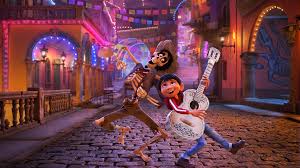Management: this is not technically anime in the Western usage of the term, but 1) I don’t care and 2) in Japanese they would call it アニメ so that works for me. Spoilers for all of Coco to follow.
Coco was a great animated movie I saw this year. I daresay it rivalled the likes of A Silent Voice, Kizu, The Night is Short, and others. Admittedly, part of the reason was because I was able to grasp its multitude of thematic threads and appreciate how they wove together, drove the story’s conflicts and plot twists, and tied everything together in a neat ribbon at the end. Allow me to indulge in a bit of gushing about these themes.
A love for music: it’s hard to discuss music separately when its conflict with the Rivera family drives the plot of the film. Looking closely, however, it seems that it’s the individuality of music that is at odds with the family: Hector leaves his family to pursue his individual dream of becoming a musician, while Miguel’s conflict is framed as his individual love for music versus his family’s values and traditions. While Ernesto’s backstabbing approach to success is arguably individuality taken to the extreme, Coco asserts that music and family do not have to be mutually exclusive: Hector is shown to have written “Remember Me” for his daughter, Imelda is revealed to love singing, and Miguel ends the film singing for his family in the following year’s Day of the Dead.

The value of family: for Miguel, his family’s dogmatic ban on music may seem oppressive, but the film asserts the fundamental strength of a family’s bonds and the need for reconciliation. Indeed, through Hector’s love for his daughter, through Imelda re-accepting Hector after learning the truth, and through all of the (deceased) Rivera family joining forces to help Miguel out, Coco reaffirms the value of the fast bonds of family. Further, despite Miguel’s differences with his family, it is their shared love for the matriarch Coco that gives them common ground and triggers their reconciliation. As if to reaffirm this theme, the film ends with an achingly bittersweet scene of Hector finally reunited with his wife and his newly-deceased-but-well-remembered daughter.
Remembrance: along with family naturally comes the idea of remembrance of departed family members. Coco treats its deceased warmly, with depictions of a happy afterlife whose inhabitants can visit their loved ones on the colourful and festive Día de los Muertos. Conversely, the opposite of remembrance–oblivion–is a fate worse than death: the afterlife’s least-remembered folk inhabit run-down slums, miserably awaiting the day they are forgotten. Indeed, Hector’s old friend crumbling into the wind is one of the most sorrowful scenes of the film. This threat of oblivion provides a poignancy to the festivities of el Día de los Muertos, and brings a sense of urgency to Hector’s fate, as the only person who remembers him is his daughter Coco, who is now an old lady with dementia. It is beautiful, then, to see Coco’s memory triggered with the song her father lovingly wrote for her (click here to see the wonderful effects of music therapy in dementia), and it is even more beautiful to see this as a turning point the Rivera family’s acceptance of music.

Coco ties its thematic threads together and ends on a bittersweet note: music is appreciated, families are reunited and conflicts resolved, and while an elder has passed on, she is remembered and is able to reunite with her loving parents in the afterlife. I loved watching Coco. It’s such a satisfying film.
You can read about the 12 Days of Anime project in the intro post here.

Ah, I’ve been wanting to see this film since the first trailers were released. It reminds of the 2014 animation The Book of Life which was an enjoyable watch. Frankly I’m just happy that we’re starting to see the rich culture of mexico explored in cinema like this.
LikeLike